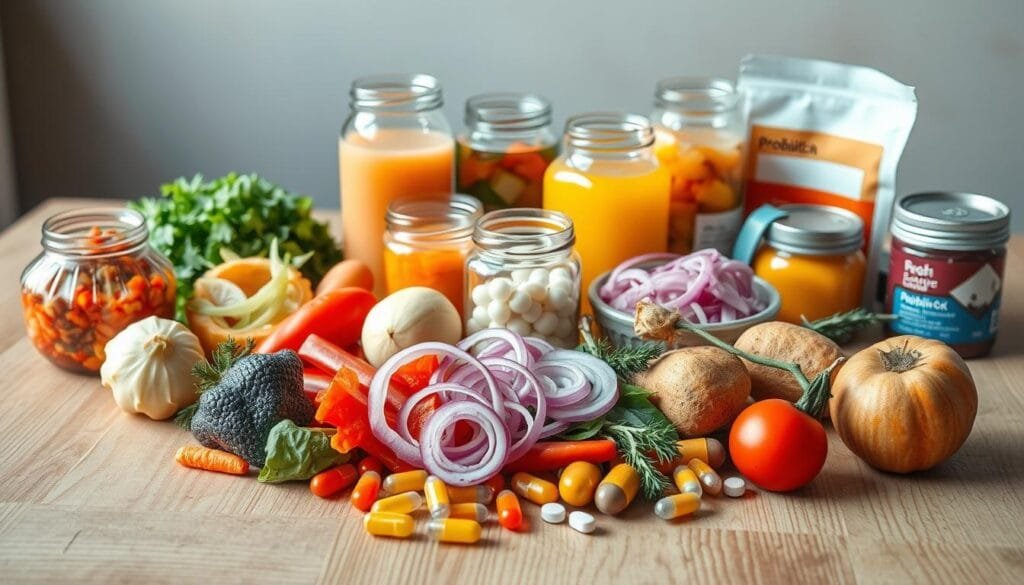Currently Empty: RM0.00
Did you know nearly 70% of your immune system lives in your digestive tract? When this delicate ecosystem gets disrupted, it can lead to fatigue, digestive struggles, and even hormonal shifts. Many people experience daily discomfort like bloating or low energy without realizing these are often signs of deeper imbalances.
Research shows that maintaining a healthy gut microbiome plays a vital role in managing systemic irritation. Specific bacterial strains help strengthen the intestinal lining while communicating with immune cells. This interaction creates a foundation for smoother digestion and more stable energy levels.
Wellness Concept specializes in personalized solutions for digestive wellness. Their team helps individuals identify the right bacterial allies through science-backed approaches. Clients in Malaysia can connect via WhatsApp at +60123822655 (Monday-Friday 9:30 am-6:30 pm, weekends 10 am-5 pm) for tailored guidance.
Key Takeaways
- Your gut houses most of your body’s disease-fighting resources
- Digestive discomfort often signals microbiome imbalances
- Targeted bacterial strains strengthen intestinal defenses
- Gut-immune communication affects whole-body wellness
- Professional guidance improves supplement effectiveness
Understanding Probiotics and Their Benefits
Imagine a bustling city inside your intestines—that’s your microbiome. This living community houses over 40 trillion microorganisms, including both helpful and harmful residents. When these populations stay balanced, they form your body’s first line of defense against digestive discomfort.
What Are Probiotics?
Probiotics are live beneficial bacteria that thrive in fermented foods and supplements. Common strains like Bifidobacterium and Lactobacillus act as natural peacekeepers in your gut. They help break down food, produce vitamins, and maintain harmony among microbial neighbors.
| Strain Type | Key Benefits | Common Sources |
|---|---|---|
| Bifidobacterium | Supports bowel regularity | Yogurt, kefir |
| Lactobacillus | Enhances nutrient absorption | Kimchi, tempeh |
How Probiotics Support Gut Health
These microbial allies strengthen intestinal walls, preventing unwanted particles from entering the bloodstream. They also produce short-chain fatty acids that nourish colon cells. Regular probiotic use helps maintain diverse bacterial populations essential for smooth digestion.
Research shows balanced gut flora improves immune responses and energy production. For best results, pair probiotics with fiber-rich foods to feed beneficial strains. This teamwork creates an environment where good bacteria naturally outcompete harmful ones.
Reduce Puffiness and Inflammation with Probiotic
Your gut houses a specialized security team working 24/7 to maintain balance. When harmful substances breach intestinal defenses, specific bacterial strains activate protective responses. This natural process forms the foundation for managing digestive discomfort and visible physical changes.

Mechanisms Behind Inflammation Reduction
Lactobacillus strains reinforce intestinal walls like microscopic repair crews. They produce compounds that seal gaps between cells, preventing toxins from entering the bloodstream. This barrier enhancement stops immune overreactions that cause tissue swelling.
Studies show certain bacteria directly influence inflammatory signals. They lower the production of cytokines – molecules that trigger swelling responses. Regular use helps create an environment where calm becomes the default state.
| Strain | Action | Result Timeline |
|---|---|---|
| Bifidobacterium lactis | Neutralizes irritants | 2-4 weeks |
| Lactobacillus acidophilus | Regulates immune cells | 3-6 weeks |
Impact on Skin and Abdominal Discomfort
A troubled gut often sends distress signals through skin texture changes. Balanced bacterial populations decrease the release of inflammatory compounds that cause facial puffiness. Many users report smoother skin texture alongside reduced digestive issues.
For abdominal concerns, specific strains break down gas-producing compounds. This action eases bloating and creates a flatter stomach profile. Pairing these bacteria with fiber-rich foods accelerates their positive effects.
Consistency matters most. While some notice changes within days, full benefits typically emerge after 4-8 weeks of daily use. Tracking progress helps identify which strains work best for individual needs.
Key Probiotic Strains for Enhanced Digestion and Immunity
Not all probiotics work the same way – their effectiveness hinges on specific bacterial varieties. Certain strains excel at breaking down food particles, while others specialize in calming irritated tissues or boosting disease resistance. Matching these microbial helpers to individual needs creates targeted support for digestive comfort and immune function.
Bifidobacterium lactis: The Gas-Busting Specialist
Bifidobacterium lactis acts like a microscopic recycling plant. It breaks down complex fibers and dairy sugars that often cause discomfort. Clinical trials show this strain reduces abdominal swelling in 68% of IBS patients within three weeks. Its ability to neutralize gut irritants makes it ideal for those managing lactose sensitivity.
Lactobacillus acidophilus & Other Power Players
This strain produces natural lactase, helping digest dairy without bloating. Studies note it improves bowel regularity in 82% of users when taken consistently. For antibiotic recovery, Saccharomyces boulardii stands out – this yeast survives medications while restoring microbial balance.
| Strain | Key Action | Best For |
|---|---|---|
| B. infantis | Calms intestinal lining | Chronic IBS |
| L. acidophilus | Enhances enzyme production | Lactose issues |
| S. boulardii | Resists antibiotics | Medication recovery |
Combining strains often yields better results than single varieties. For example, pairing Bifidobacteria with Lactobacillus creates a symbiotic relationship – one breaks down food while the other strengthens gut barriers. Always consult experts to match strains to your symptoms and lifestyle.
Incorporating Probiotics into Your Daily Routine
Building a probiotic habit doesn’t require drastic changes. Small, consistent choices can significantly impact gut health over time. Let’s explore practical ways to make these beneficial microbes work for you.

Supplementation Versus Fermented Foods
Capsules and powders offer concentrated doses of specific strains like Bifidobacterium infantis. These work well for targeting particular digestive concerns. Most survive best when taken 30 minutes before meals – stomach acid levels are lower then.
Fermented foods provide diverse bacterial communities. Yogurt delivers Lactobacilli, while kimchi packs different strains. Try adding one fermented item daily: a spoonful of sauerkraut at lunch or kombucha as an afternoon refreshment.
| Source | Key Strains | Daily Serving |
|---|---|---|
| Kefir | Bifidobacteria | 1/2 cup |
| Miso soup | Lactobacillus | 1 tablespoon |
| Supplements | Multi-strain blends | As directed |
Storage matters! Keep supplements in cool, dry places. Refrigerate most fermented foods after opening to preserve live cultures. Check expiration dates – active strains decrease over time.
Morning routines help consistency. Pair supplements with breakfast or mix powdered forms into overnight oats. For busy schedules, set phone reminders until probiotic-rich snacks become second nature.
Lifestyle and Dietary Changes for Optimal Gut Health
Your plate holds the power to transform your gut ecosystem more than you realize. Strategic food choices work alongside probiotics to create lasting digestive harmony. Simple swaps and mindful eating habits can dramatically influence microbial diversity and intestinal function.
Anti-Inflammatory Foods to Enjoy
Colorful, nutrient-dense options provide building blocks for a resilient digestive system. Berries deliver antioxidants that protect intestinal cells, while fatty fish like salmon supply omega-3s for gut barrier repair. These choices help maintain microbial balance crucial for overall wellness.
| Food Group | Key Components | Health Impact |
|---|---|---|
| Leafy Greens | Chlorophyll | Supports detox pathways |
| Turmeric | Curcumin | Calms tissue irritation |
| Kefir | Probiotics | Enhances bacterial diversity |
Foods and Habits to Avoid
Certain items disrupt gut equilibrium, worsening existing conditions. Processed snacks often contain hidden sugars that feed harmful bacteria. Alcohol weakens intestinal defenses, making the gut more vulnerable to imbalances.
Fiber-rich vegetables act as natural prebiotics, fueling beneficial microbes. Try roasting broccoli with olive oil – its polyphenols strengthen cell walls. For sensitive individuals, eliminating gluten temporarily might reveal hidden triggers.
| Potential Triggers | Primary Concern | Healthier Alternative |
|---|---|---|
| Refined Sugar | Promotes bad bacteria | Fresh fruit |
| Fried Foods | Damages lining | Baked options |
| Artificial Sweeteners | Alters microbiome | Raw honey |
Managing Side Effects and Monitoring Digestive Progress
Starting a new probiotic routine can feel like meeting new neighbors—some initial adjustments are normal. Most people experience temporary changes as their gut adapts to beneficial bacterial reinforcements. Tracking these shifts helps distinguish between harmless adjustments and signals needing attention.
Recognizing Mild Side Effects
Early probiotic use often triggers mild symptoms like gas or irregular bowel movements. These effects typically fade within 3-7 days as microbial balance improves. Consider these reactions proof your gut environment is evolving:
| Symptom | Typical Duration | Management Tip |
|---|---|---|
| Bloating | 2-5 days | Drink peppermint tea |
| Temporary cramping | 1-3 days | Reduce dose temporarily |
| Mucus in stool | Up to 1 week | Increase water intake |
Those managing gas concerns can try splitting doses morning and evening. Gradually increasing intake over 10 days helps sensitive systems adapt smoothly.
When to Consult a Healthcare Professional
Persistent symptoms lasting over 14 days warrant medical advice. Seek immediate help for severe abdominal pain, bloody stools, or fever—these rarely link to probiotics but require evaluation.
High-risk groups should always consult doctors before starting supplements:
- People undergoing chemotherapy
- Individuals with organ transplants
- Those using immunosuppressant medications
Track daily changes using a symptom journal. Note energy levels, digestion patterns, and skin appearance. Many find improvements in non-digestive areas like sleep quality after consistent use.
Wellness Concept’s Expert Guidance and Consultation
Navigating probiotic options feels overwhelming for many people. Wellness Concept simplifies this process through science-backed consultations tailored to individual digestive needs. Their team helps identify which strains may help specific concerns while considering lifestyle factors.
Personalized Support Through WhatsApp
Clients connect directly with nutrition experts via +60123822655. This convenient service allows real-time discussions about symptoms, dietary habits, and health goals. Research shows personalized probiotic management often yields better results than generic approaches.
Common consultation topics include:
- Strain selection for persistent bloating
- Combining supplements with anti-inflammatory foods
- Timing strategies for maximum effectiveness
Accessible Expertise Across Time Zones
Advisors operate Monday-Friday (9:30 am-6:30 pm) and weekends (10 am-5 pm). These hours accommodate working professionals and weekend planners alike. Many people find ongoing support crucial for maintaining gut health improvements.
| Service Feature | Benefit | Typical Outcome |
|---|---|---|
| Strain Matching | Targeted symptom relief | 2-3 week improvement window |
| Diet Synergy Plans | Enhanced probiotic performance | Better nutrient absorption |
| Progress Tracking | Adjustable strategies | Sustained digestive comfort |
Wellness Concept’s approach combines probiotic recommendations with stress management techniques. This holistic method addresses root causes rather than just symptoms. Their experts may help clients establish routines that fit seamlessly into Malaysian lifestyles.
Conclusion
Maintaining digestive balance requires more than quick fixes—it demands smart microbial partnerships. A thriving gut ecosystem serves as the body’s command center, influencing everything from nutrient processing to immune responses. For those navigating persistent bloating, targeted probiotics offer science-backed solutions when combined with consistent habits.
Wellness Concept’s team helps Malaysians identify strains that align with their unique biology. Whether through fermented foods or precision supplements, rebuilding microbial diversity takes patience. Many clients report steadier energy and improved comfort after 4-6 weeks of dedicated care.
Ready to explore personalized strategies? Connect via WhatsApp at +60123822655 for guidance matching your lifestyle. Small daily choices create lasting changes—your gut deserves nothing less than thoughtful, expert-supported care.
FAQ
How do probiotics improve gut health?
Probiotics introduce beneficial bacteria into the digestive system, which balance gut flora. This strengthens the intestinal barrier, supports digestion, and enhances nutrient absorption. Strains like Lactobacillus acidophilus also help manage symptoms like bloating or irregular bowel movements.
Can probiotics ease abdominal discomfort?
Yes. Certain strains, such as Bifidobacterium lactis, reduce gas production and regulate bowel activity. Studies suggest they may alleviate abdominal pain linked to conditions like irritable bowel syndrome (IBS) by calming gut inflammation.
What foods naturally contain probiotics?
Fermented foods like yogurt, kefir, sauerkraut, and kimchi are rich in live cultures. Including these in meals supports a healthy microbiome without relying solely on supplements. Pairing them with fiber-rich foods maximizes their benefits.
Are there side effects when starting probiotics?
Some people experience mild bloating or gas during the first few days as the gut adjusts. These effects usually subside as the body adapts. If symptoms persist, consulting a healthcare professional is recommended.
How long does it take to see results from probiotics?
This varies based on individual health and strain potency. Many notice improvements in digestion within 1–2 weeks, while benefits for skin or chronic inflammation may take 4–8 weeks. Consistency is key for long-term gut balance.
Can probiotics boost immunity?
Research shows a balanced microbiome supports immune function. Strains like Lactobacillus rhamnosus may reduce the risk of infections by enhancing the body’s natural defenses. A healthy gut also aids in managing inflammatory responses.
Should I take supplements or eat fermented foods?
Supplements offer targeted strains for specific issues, like IBS management. Fermented foods provide diverse bacteria and nutrients. Combining both often yields optimal results, but consult an expert like Wellness Concept for personalized advice.
How can I contact Wellness Concept for guidance?
Reach their experts via WhatsApp: +60123822655 during business hours (Mon–Sat, 9 AM–6 PM). They offer tailored recommendations for probiotic use, dietary adjustments, and long-term gut health strategies.


